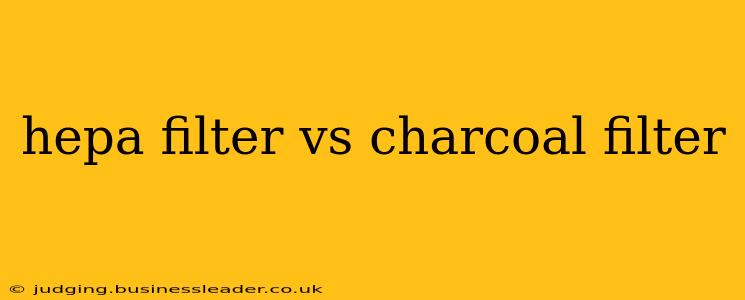Choosing the right air purifier can feel overwhelming, especially when faced with the myriad of filter types available. Two of the most common are HEPA filters and charcoal filters. While both aim to improve air quality, they tackle different pollutants, making the choice dependent on your specific needs and the types of contaminants present in your environment. This comprehensive guide will delve into the differences between HEPA and charcoal filters, helping you make an informed decision.
What is a HEPA Filter?
HEPA stands for High-Efficiency Particulate Air. HEPA filters are designed to remove microscopic particles from the air, including allergens like pollen, dust mites, pet dander, mold spores, and even some bacteria and viruses. They achieve this through a complex matrix of tightly woven fibers that trap particles as air passes through. True HEPA filters must meet a specific standard: they're required to remove at least 99.97% of particles 0.3 microns in size. Particles smaller than 0.3 microns are actually easier to filter because they're more likely to collide with the filter fibers. Larger particles are even more easily removed.
What are HEPA filters good for?
HEPA filters excel at removing airborne particulate matter. This makes them ideal for individuals with allergies, asthma, or other respiratory sensitivities. They are also beneficial in homes with pets, as they effectively remove pet dander, a common allergen. In environments with significant dust or construction, HEPA filters can significantly improve air quality.
What is a Charcoal Filter (Activated Carbon Filter)?
Charcoal filters, also known as activated carbon filters, use activated charcoal to absorb various gases and odors from the air. Activated charcoal is a highly porous material with a vast surface area, allowing it to trap odor-causing molecules, volatile organic compounds (VOCs), and certain gases.
What are charcoal filters good for?
Charcoal filters are best suited for eliminating unpleasant smells like smoke, cooking odors, pet smells, and chemical fumes. They can also help remove some VOCs, which are released from various household products and building materials. However, they are generally not effective at removing particulate matter like dust or pollen.
HEPA Filter vs. Charcoal Filter: Key Differences
| Feature | HEPA Filter | Charcoal Filter |
|---|---|---|
| Primary Function | Removes particulate matter | Absorbs gases and odors |
| Particle Removal | Highly effective (99.97% of 0.3-micron particles) | Ineffective |
| Gas/Odor Removal | Ineffective | Highly effective |
| Maintenance | Requires replacing less frequently (depending on usage) | Requires replacing more frequently (depending on usage) |
| Cost | Generally more expensive initially | Generally less expensive initially |
Which Filter Do I Need?
The best filter for you depends on your specific needs.
- If you primarily need to remove allergens and particulate matter: A HEPA filter is your best choice.
- If you mainly want to eliminate odors and gases: A charcoal filter is more suitable.
- For optimal air purification: Many air purifiers combine both HEPA and charcoal filters, providing comprehensive protection against a wide range of pollutants. This combination tackles both particles and gases, offering the most thorough air cleaning.
How Often Should I Replace My Filters?
Filter replacement frequency depends on factors like usage, air quality, and the type of filter. Check your air purifier's manual for recommendations. Generally, HEPA filters last longer than charcoal filters, but both will need replacement eventually to maintain optimal performance.
Can I Clean My Filters?
No, HEPA and charcoal filters are generally not washable. Attempting to clean them often damages their effectiveness, compromising their ability to trap particles or absorb gases. Always replace filters according to the manufacturer's instructions.
What about other types of filters?
Beyond HEPA and charcoal, other filter types exist, such as UV-C light filters, which kill microorganisms, and electrostatic precipitators, which use electrical charges to attract and remove particles. However, HEPA and charcoal filters remain the most prevalent and effective for most common indoor air quality concerns.
This information should provide a solid understanding of the differences between HEPA and charcoal filters. Remember to consider your specific needs and environmental conditions when selecting an air purifier and its filters to ensure you achieve the cleanest and healthiest indoor air possible.
